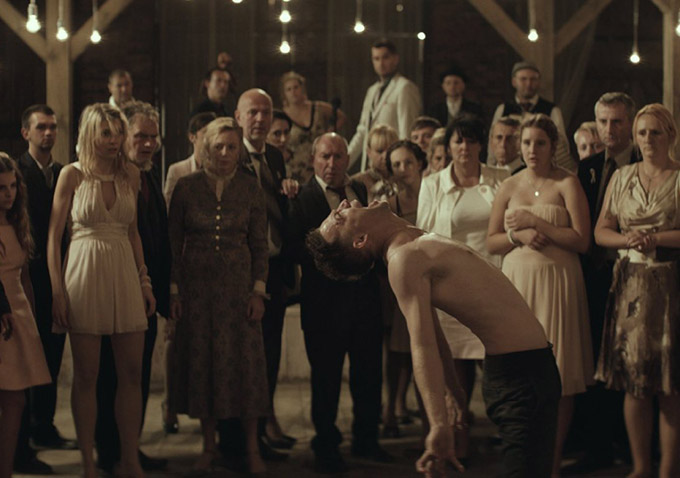The marriage of a possession-driven horror film and a wedding comedy initially seems like an odd, opposites-attract union, especially when you add elements of the enduring legacy of the Holocaust in Poland. Theoretically, combining these elements shouldn’t work, leaving the audience in a state of whiplash as they’re thrown from one end of the genre spectrum to the other. But thanks to the talent of director Marcin Wrona, “Demon” combines these seemingly disparate threads to create an unsettling, oddly funny film with more to say than either the average horror film or comedy.
Loosely based on Piotr Rowicki’s play “Adherence,” “Demon” quickly moves outside the confines of a stage production. It begins by traveling in a small town in Poland, where buildings and the bright yellow of a front loader are vivid against a backdrop of fog, the first evidence of the film’s fine cinematography from Pawel Flis. Piotr (Itay Tiran), called “Python” by his friends, comes from England to a small Polish island to meet his bride, Zaneta (Agnieszka Zulewska). They will be living in her family’s home, a country house that’s stood for decades and is now crumbling and in need of renovation. A front loader sits on the property, and some digging quickly unearths bones buried close to the house. Piotr falls into these remains in the mud, and soon begins to be haunted and transformed by their presence.
As the wedding festivities go on through the day and night, he begins showing more and more symptoms that confound his new in-laws, a doctor (Adam Woronowicz) and a pastor (Cezary Kosiński). Only an aging Jewish professor (Włodzimierz Press) offers an explanation: Piotr has been possessed by a dybbuk, a malicious spirit out of Jewish legend. Tales of possession often require physical feats from the actors playing the victims, and “Demon” is no exception. Tiran contorts his body and has mastered the art of falling, but he is equally able to communicate Piotr’s own joy and emotional pain. As Piotr begins exhibiting more and more of the dybbuk’s influence, his new bride, her father (Andrzej Grabowski in a standout comic performance) and the rest of her family attempt to show that all is well to their guests with varying results.
Alternately to its credit and its detriment, “Demon” is stuck in the netherworld between a moody horror film, a relationship drama and a comedy of manners. This is a challenge both for those trying to market the film, as well as viewers trying to get their bearings. The film does each well in the time that it devotes to each genre, but the movement between them means it never fully resides in a single state. The horror elements around the dybbuk are unsettling (though never truly terrifying), and the discordant tones of the score from Marcin Macuk and Krzysztof Penderecki contribute to that feeling. When “Demon” stays closest to its horror and drama elements, it has echoes of Wrona’s countryman Roman Polanski’s early work in films like “Repulsion” and “The Tenant.” However, billing the film as straight-out horror could also be misleading as well.
As the film progresses, it cuts between scenes of Piotr’s unraveling and the proportional descent of the wedding festivities. It raises the question of how well one can know one’s partner and how entering into marriage is a new phase in life that can appear to be a metamorphosis. But the choice of the dybbuk as the possessing spirit is not a coincidence; the film is also haunted by the specter of the Holocaust and its effects on Poland. The soul that takes over Piotr’s body belongs to a young woman who mysteriously disappeared during World War II, just before her own wedding. What makes her appearance particularly poignant is that with the exception of the professor, she is the only Jewish person at the celebration, definitively marking their absence not only at the ceremony but also in the larger culture. Despite its larger questions and their serious nature, “Demon” is also a funny examination a wedding reception gone wrong and how the answer to the problem here always seems to be more vodka. But even though the film only takes place across the span of a few days from Piotr’s arrival to the aftermath of the ceremony, it seems to trudge through the mud in its attempt to reach its conclusion.
Critics may find it challenging to review “Demon” without commenting on its director Wrona’s suicide, which occurred shortly before the film was set to premiere at Gdynia Film Festival in Poland last year. It may be easy to say how “Demon” and its protagonist are suffused with sadness in a likely mirror for their creator, but that threatens to be too simplistic a take on Wrona’s struggles. Prior to “Demon,” the director showed promise with two features “The Christening” and “My Flesh My Blood,” and this is a loss to the international film community, to say nothing of its effects on his family and friends. As his last work, “Demon” is a film that improves the longer it sits with you, as various images seep into your consciousness and reappear without warning. Credit for its success lies with Wrona and his lead, who worked together to create a chilling, modern version of a folk tale. [B]

